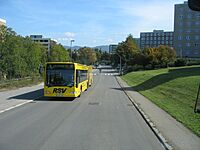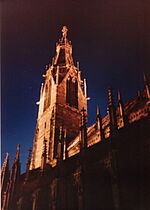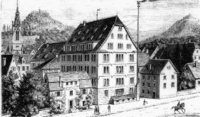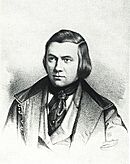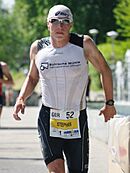Reutlingen facts for kids
Quick facts for kids
Reutlingen
|
|||
|---|---|---|---|
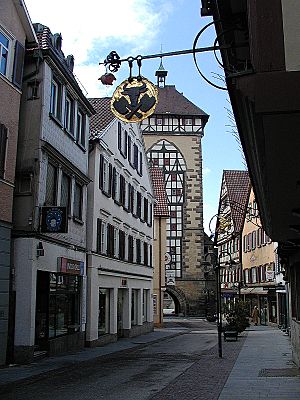
A street view of Reutlingen
|
|||
|
|||
| Country | Germany | ||
| State | Baden-Württemberg | ||
| District | Reutlingen | ||
| Elevation | 382 m (1,253 ft) | ||
| Population
(2022-12-31)
|
|||
| • Total | 117,547 | ||
| Time zone | CET/CEST (UTC+1/+2) | ||
| Postal codes |
72760–72770
|
||
| Dialling codes | 07121, 07072, 07127 | ||
| Vehicle registration | RT | ||
| Website | www.reutlingen.de | ||
Reutlingen is a city in Baden-Württemberg, Germany. It is the main city of the Reutlingen district. In June 2018, about 116,456 people lived there.
Reutlingen is home to Reutlingen University, a special university started in 1855. It began as a school for weavers. Today, Reutlingen is known for its textile industry. It also makes machines, leather goods, and steel. The city has the world's narrowest street, called Spreuerhofstraße, which is only 31 centimeters wide!
Contents
Exploring Reutlingen's Location
Reutlingen is about 35 kilometers (22 miles) south of Stuttgart, the capital of Baden-Württemberg. It is in the southwest part of Germany. The city sits right next to the Swabian Jura mountains. This is why it is often called The gateway to the Swabian Jura.
The Echaz river flows through the center of Reutlingen. This river is a small branch of the Neckar river. Reutlingen is a key city in the Neckar-Alb region. It is also part of the larger Stuttgart Metropolitan Region.
Reutlingen's Climate
| Climate data for Reutlingen (1991-2020) | |||||||||||||
|---|---|---|---|---|---|---|---|---|---|---|---|---|---|
| Month | Jan | Feb | Mar | Apr | May | Jun | Jul | Aug | Sep | Oct | Nov | Dec | Year |
| Daily mean °C (°F) | 1.2 (34.2) |
2.2 (36.0) |
5.9 (42.6) |
10.0 (50.0) |
14.1 (57.4) |
17.6 (63.7) |
19.4 (66.9) |
18.9 (66.0) |
14.5 (58.1) |
10.0 (50.0) |
5.2 (41.4) |
2.2 (36.0) |
10.1 (50.2) |
| Average precipitation mm (inches) | 43.3 (1.70) |
39.0 (1.54) |
48.2 (1.90) |
48.8 (1.92) |
92.1 (3.63) |
87.7 (3.45) |
96.0 (3.78) |
87.0 (3.43) |
58.5 (2.30) |
60.4 (2.38) |
56.2 (2.21) |
53.1 (2.09) |
770.3 (30.33) |
| Mean monthly sunshine hours | 61.2 | 86.5 | 138.6 | 179.9 | 203.3 | 222.4 | 240.1 | 224 | 167.7 | 113.1 | 65.4 | 52 | 1,754 |
| Source: Deutscher Wetterdienst | |||||||||||||
Reutlingen's Past
People first settled in the Reutlingen area around the 4th or 5th century. Around 1030, a count named Egino began building a castle. This castle was on top of the Achalm, a large mountain about 706 meters high. One of the castle's towers was rebuilt in the 1800s and can be visited today.
The name Reutlingen was first written down around 1089–90. This was in an old agreement called the Bempflingen Treaty. In 1180, Reutlingen was given the right to hold markets by Frederick Barbarossa. This helped the settlement grow.
Between 1220 and 1240, Reutlingen became a city. City walls and defenses were built to protect it. Soon after, from 1247 to 1343, the famous St. Mary's Church was built.
In 1377, Reutlingen was part of a big victory for the Swabian League. This group of 14 cities, led by Ulm, defeated the Count of Württemberg. Reutlingen became an Imperial Free City. This meant it was free from the Duke of Württemberg's rule.
In 1530, Reutlingen's city council signed the Augsburg Confession. This was an important document for Lutheranism. In 1803, Reutlingen lost its independence. It became part of Württemberg.
The worst event in Reutlingen's history was a huge fire in 1726. The fire lasted three days. It destroyed 80% of homes and most public buildings. About 1,200 families lost their homes. You can still see the effects of this fire today.
During World War II, parts of the V-1 flying bomb were made in Reutlingen. Because of this, the city was bombed by Allied forces. After the war, Oskar Kalbfells helped rebuild Reutlingen. He was the first mayor chosen by the people after World War II.
In 1947, Reutlingen became part of the new state of Württemberg-Hohenzollern. This state later joined with Baden-Württemberg in 1952.
People from Other Countries in Reutlingen
Reutlingen is home to people from many different countries. Here are some of the larger groups living in the city in 2018:
| Significant minority groups | |
| Nationality | Population (2018) |
|---|---|
| 3,173 | |
| 2,594 | |
| 2,013 | |
| 1,875 | |
| 1,732 | |
| 1,391 | |
| 1,305 | |
| 960 | |
| 955 | |
| 726 | |
| 674 | |
City Leaders
Here are some of the people who have served as the main leader (Lord Mayor) of Reutlingen:
- 1929–1933: Karl Haller
- 1933–1945: Richard Dederer
- 1945–1973: Oskar Kalbfell
- 1973–1994: Manfred Oechsle
- 1995–2003: Stefan Schultes
- 2003–2019: Barbara Bosch
- since 2019: Thomas Keck
Getting Around Reutlingen
City buses in Reutlingen are run by Reutlinger Stadtverkehr (RSV). Trains run from Reutlingen Hauptbahnhof (main station) and other stations like Reutlingen West, -Sondelfingen, and Reutlingen-Betzingen. These trains are operated by Deutsche Bahn and Abellio Rail Baden-Württemberg.
Top Places to See
- Church of the Virgin Mary: This church was built in the Gothic style between the 13th and 14th centuries. You can find a statue of Emperor Frederick II nearby.
- Marktbrunnen (Market Fountain): This fountain is from the 16th century. It has a statue of Emperor Maximilian II on top.
- Spitalhof: This building was first a hospital in the 14th century. It was damaged by fire and mostly rebuilt in the 18th century.
- Church of St. Nicholas: This church was built in the 14th century as a small chapel.
- Gerber- und Färberbrunnen (Tanners' and Dyers' Fountain): This fountain was built in 1920.
- City hall: The current city hall was built in 2013.
- Spreuerhofstraße: This is famous for being the world's narrowest street!
Local Culture and Traditions
On Mutscheltag, which is the first Thursday after Epiphany, people in Reutlingen gather. They play dice games in halls and homes. The winner of these games gets parts or whole loaves of a special bread called Mutschel. These Mutschelspiele (Mutschel games) are made of smaller games. Winners are decided for each small game and for the total score at the end. This tradition is special to Reutlingen.
Education in Reutlingen
Reutlingen University is a university that focuses on hands-on learning. For example, all business students must complete an internship. The university welcomes students from all over the world. It has over 200 partnerships with universities globally. Classes are usually taught in German. However, some Bachelor's and Master's programs are taught in English.
Sister Cities Around the World
Reutlingen has special partnerships with other cities around the world. These are called twin towns or sister cities:
Famous People from Reutlingen
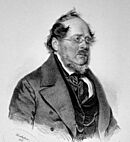
Many notable people have come from Reutlingen, including:
- Sebastian Gryphius (around 1492–1556), a bookseller and printer.
- Friedrich List (1789–1846), a German-American economist.
- Alexander Bruckmann (1806–1852), a painter of history and portraits.
- Hermann Kurz (1813–1873), a poet and writer.
- Henry Fox (1833–1906), a German soldier who fought in the American Civil War.
- Emanuel Hahn (1881–1957), a Canadian sculptor and coin designer.
- Ferdinand Heim (1895–1971), a general.
- Helmuth Naumer (1907–1990), an artist who painted landscapes of New Mexico.
- Walter Vielhauer (1909–1986), a trade union leader and politician.
- Walter G. Spohn (1914–2003), who started the American Anaplastology Association.
- Martin Hengel (1926–2009), a Protestant pastor and historian.
- Willi Betz (1927–2015), who founded a large international shipping company.
- Friedrich Wilhelm Schnitzler (1928–2011), a landowner and politician.
- Roland Kayn (1933–2011), an organist and composer.
- Ernst Messerschmid (born 1945), an astronaut and physicist.
- Claus Kleber (born 1955), a television journalist.
- Dominik Kuhn (born 1969), a producer, language artist, and comedian.
Sports Stars from Reutlingen
- Julius Wagner (1882–1952), won a team gold medal in tug of war at the 1906 Olympics.
- Michael Krumm (born 1970), a racing driver.
- Stephan Vuckovic (born 1972), a triathlon athlete who won a silver medal at the 2000 Summer Olympics.
- Ole Bischof (born 1979), a judoka who won a gold medal in Judo at the 2008 Summer Olympics.
- Dennis Geiger (born 1984), a footballer who played over 250 games.
- Tobias Feisthammel (born 1988), a footballer who played over 380 games.
- Sven Schipplock (born 1988), a footballer who has played over 290 games.
Images for kids
See also
 In Spanish: Reutlingen para niños
In Spanish: Reutlingen para niños
 | Precious Adams |
 | Lauren Anderson |
 | Janet Collins |




